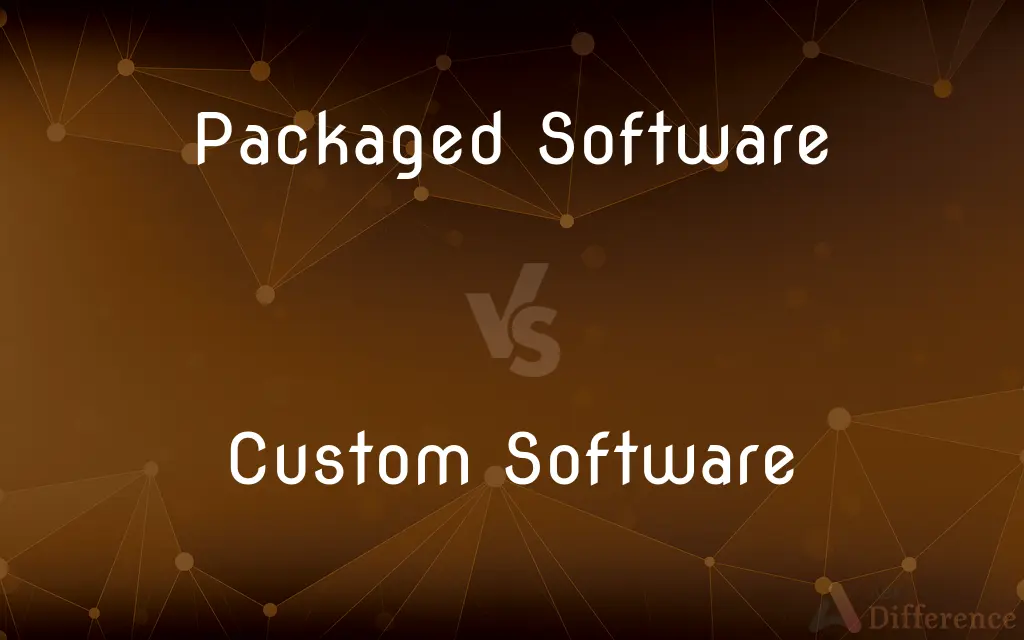Packaged Software vs. Custom Software — What's the Difference?
By Tayyaba Rehman & Maham Liaqat — Published on September 23, 2024
Packaged Software is pre-built, mass-market software designed for a wide audience with general features. Custom Software is tailored to meet the specific needs of an individual or business, offering bespoke solutions.

Difference Between Packaged Software and Custom Software
Table of Contents
ADVERTISEMENT
Key Differences
Packaged Software, also known as off-the-shelf software, is developed to cater to a broad audience, encompassing generic features that aim to meet the common needs of its users. It is readily available for purchase or download and often comes with a fixed price.
Custom Software, in contrast, is specifically designed and developed to address the unique requirements of a particular user or organization. It involves a bespoke development process that considers the specific preferences, processes, and objectives of the client, resulting in a unique product.
One of the main advantages of Packaged Software is its immediate availability and lower upfront cost compared to Custom Software. It allows users to quickly implement new software without the wait time associated with development. However, Custom Software offers a tailored fit to business processes, potentially leading to greater efficiency and competitive advantage, albeit with a higher initial investment and longer development time.
Packaged Software typically comes with a predefined set of features, and users must adapt their processes to the software's capabilities. This can lead to underutilization of the software’s features or the need for additional software to fill gaps. Conversely, Custom Software is developed to align with the user’s workflow, ensuring that every feature is designed to enhance the organization's operations, potentially eliminating the need for multiple software solutions.
In terms of scalability and integration, Packaged Software may have limitations or require additional investments to scale or integrate with other systems. Custom Software, on the other hand, can be built with scalability in mind, ensuring it grows with the business and integrates seamlessly with existing tools and systems, offering a more cohesive technology ecosystem.
ADVERTISEMENT
Support and updates for Packaged Software are generally provided by the vendor, with updates and new features based on general user demand. Custom Software allows for personalized support and the flexibility to update and adapt the software as the business evolves, ensuring it continues to meet its changing needs.
Comparison Chart
Target Audience
Broad market with general needs.
Specific individual or business needs.
Development Approach
Mass-produced with generic features.
Tailored development for bespoke needs.
Cost
Lower upfront cost, fixed pricing.
Higher initial investment, variable pricing.
Implementation Time
Quick to deploy, immediately available.
Longer development and implementation time.
Customization
Limited, must adapt to software capabilities.
Highly customizable to fit precise requirements.
Scalability & Integration
May have limitations or extra costs.
Built to scale and integrate seamlessly.
Support & Updates
Provided by vendor, based on general demand.
Personalized support, updates as needed.
Compare with Definitions
Packaged Software
Ready for immediate use upon purchase.
The graphic design team used packaged software for editing and creating images.
Custom Software
Provides flexibility for future updates and changes.
The custom software was updated to add new features as the company expanded its services.
Packaged Software
Fixed price and often includes regular updates.
The office suite software came with a yearly subscription fee for updates.
Custom Software
Software tailored to meet specific business needs.
The logistics company developed custom software for its unique shipping and tracking needs.
Packaged Software
May require adaptation of business processes.
The HR department adjusted its onboarding process to fit the capabilities of the packaged HR software.
Custom Software
Involves a bespoke development process.
The development of custom ERP software was based on detailed input from all departments.
Packaged Software
Pre-built software designed for the mass market.
The company purchased a packaged accounting software to manage its finances.
Custom Software
Requires a higher initial investment but is highly scalable.
The investment in custom software for inventory management scaled with the business growth.
Packaged Software
Offers a broad range of general features.
The packaged CRM software includes sales, marketing, and customer service modules.
Custom Software
Offers a competitive advantage through unique features.
The custom e-commerce platform integrated innovative sales tools not available in off-the-shelf solutions.
Common Curiosities
What is Custom Software?
Software specifically developed to meet the unique requirements of a single user or organization.
Is Custom Software more expensive than Packaged Software?
Initially, yes, due to the bespoke development process, but it can offer long-term savings and value.
What is Packaged Software?
Software developed for a wide audience with general features, ready for immediate use.
Can Packaged Software be customized?
To some extent, but within the limits of the software's capabilities.
How does Custom Software support business growth?
It's scalable and can evolve with the business, ensuring long-term alignment with business goals.
Do updates for Packaged Software cost extra?
It depends on the vendor's policy; some may offer free updates, while others charge.
Why choose Packaged Software?
It's cost-effective, quickly deployable, and suitable for general needs.
Why opt for Custom Software?
For tailored solutions that fit specific business processes and offer competitive advantages.
Can Custom Software integrate with existing systems?
Yes, it is often designed with integration in mind to enhance the existing technology ecosystem.
How does Custom Software offer a competitive advantage?
By providing unique features not available in generic software, enhancing efficiency or customer experience.
Is ongoing support available for Custom Software?
Yes, personalized support is a key advantage of custom solutions.
How long does it take to implement Custom Software?
The timeline varies based on complexity but generally takes longer than deploying Packaged Software.
What is the main disadvantage of Packaged Software?
The potential need to adapt business processes to fit the software's limitations.
Is Packaged Software a good choice for small businesses?
Yes, if their needs align with the software's features, it can be a cost-effective and quick solution.
Can Packaged Software handle specific industry needs?
It may offer industry-specific versions, but with less flexibility than custom solutions.
Share Your Discovery

Previous Comparison
Chamilia Bracelet vs. Pandora Bracelet
Next Comparison
Civil Court vs. Criminal CourtAuthor Spotlight
Written by
Tayyaba RehmanTayyaba Rehman is a distinguished writer, currently serving as a primary contributor to askdifference.com. As a researcher in semantics and etymology, Tayyaba's passion for the complexity of languages and their distinctions has found a perfect home on the platform. Tayyaba delves into the intricacies of language, distinguishing between commonly confused words and phrases, thereby providing clarity for readers worldwide.
Co-written by
Maham Liaqat












































